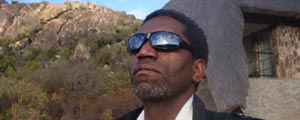
Last week I attended a wedding at one of Harare’s exclusive, treacherous-to-access plush “mountain homes”.
Column by Rejoice Ngwenya
Inevitably, at such events where sophisticated five-digit bank account socialites converge, it would be difficult, if not outright impossible, to evade the ghost of political debate that trails me like a famished jackal.
Whenever I encounter enlightened citizens — on a bus, plane, funeral, wedding, church, conference — my first duty as a responsible Zimbabwean activist is to deride, demean, and denigrate Zanu PF’s barbaric dictatorship. It’s habitual — like smoking — a necessary evil for troubled minds.
By sheer coincidence, the leadership qualities of MDC-T presidential candidate Morgan Tsvangirai and his political entourage were placed on the altar of debate. It was not so much that Zanu PF perennial contestant Robert Mugabe was seen as “better” —although some argued that his treachery has made him survive bruising battles for four decades.
There were — of course — two schools of thought. One, that if Tsvangirai was “better” than Mugabe, he would have shown drastic difference in his worldview of luxury, opulence and love for women.
That school roasted him for failing to inculcate a sense of responsible leadership in his Members of Parliament and councillors who have shown an insatiable appetite for blissful living compared only to Zanu PF top leadership.
The protagonists argued how local authorities had become havens of profiteering, corruption and decadence. Water had disappeared from taps while pot-holes had become entrenched in the highway code of vehicular genetics. The school pounded Tsvangirai’s migration from the humble jacaranda environs of Strathaven to the dreamy palm trees of Highlands. He was pummeled for chasing women and marrying a Zanu PF bride, frolicking on high seas and treating young girls like sex toys.
- Chamisa under fire over US$120K donation
- Mavhunga puts DeMbare into Chibuku quarterfinals
- Pension funds bet on Cabora Bassa oilfields
- Councils defy govt fire tender directive
Keep Reading
Tsvangirai was “accused” of lacking political strategy and being plenty on rhetoric and demagoguery, but shot on strategy. They said he promised change in 2000, yet in 2013, he still gives Zanu PF as an excuse for failure. Ultimately, Tsvangirai was said to be at the basement of leadership finesse.
The second school of thought was adamant that not all good leaders are comparable to Martin Luther King or Nelson Mandela. They insisted that Tsvangirai had “inherited” a system paralysed by a culture of impunity and corruption, such that his “lack of power” stunted his capacity to change things.
The instruments of hate in Zanu PF were applied ruthlessly to defeat the MDC-T mission of transformation. One gave an example of how Local Government minister Ignatius Chombo goes through each council resolution with a toothpick to defeat council policy.
They argued vehemently that Police Commissioner-General Augustine Chihuri, Justice minister Patrick Chinamasa, Registrar-General Tobaiwa Mudede, ZBC chief executive Happison Muchechetere, Zimbabwe Media Commission chief executive Tafataona Mahoso, Saviour Kasukuwere, Mines minister Obert Mpofu and Chief Justice Godfrey Chidyausiku were instruments of hate and repression applied effectively by Mugabe to thwart the noble intentions of Tsvangirai and MDC-T.
One “brave” guest insisted that on an intellectual and “moral uprightness” scale, both MDC leader Welshman Ncube and Mavambo/Kusile/Dawn leader Simba Makoni would easily rout Mugabe and Tsvangirai.
MDC-T sympathisers insisted that morality and intellect had no bearing on political competency!
They were quick to cite South Africa President Jacob Zuma, former US president Bill Clinton and ex-Italian Prime Minister Silvio Berlusconi as examples of insignificance of moral attributes in political leadership. “Presidential leadership is not a contest for university chancellorship,” mumbled one protagonist.
Adjudicating such ‘free style’ debates requires great skill, since everyone wants their opinion head simultaneously. In retrospect, I can only marvel at why we Africans set ourselves up for leadership disaster.
I would have thought that morality and intellect totally outweigh populist flattery and demagoguery in modern political choices. But I am not a politician, so what would I know?











